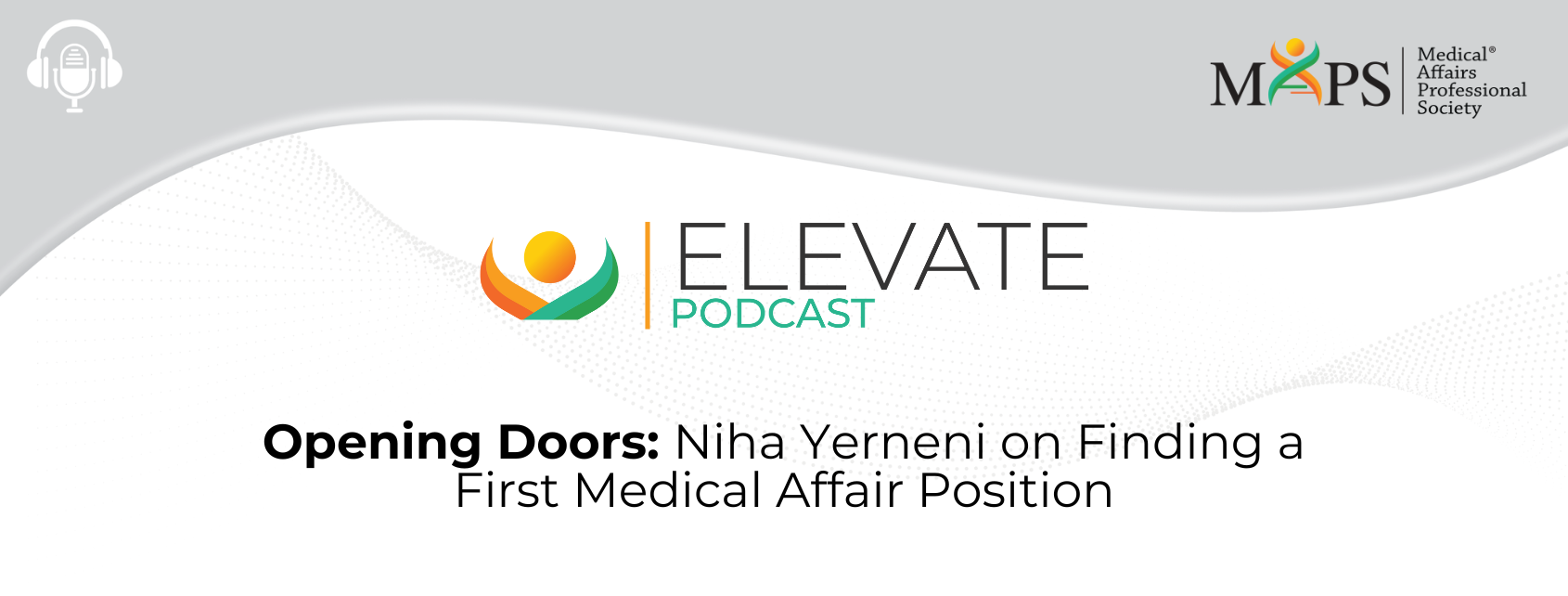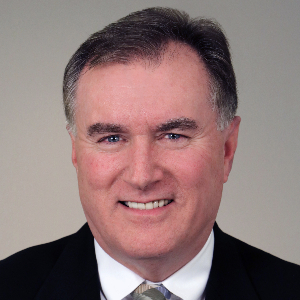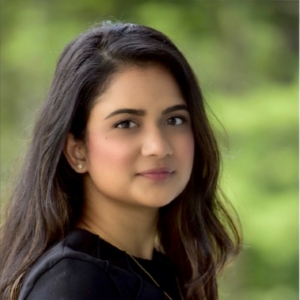Opening Doors: Niha Yerneni on Finding a First Medical Affairs Position
Speaker: Kirk Shepard, MD
Speaker: Niha Yerneni
Opening Doors episodes of the MAPS Elevate Podcast Series give Medical Affairs professionals the opportunity to tell the story of how they found their way into the profession and to offer advice to others seeking Medical Affairs positions. Here MAPS co-founder, Kirk Shepard, speaks with Niha Yerneni, Medical Scientific Affairs Manager at Ironwood Pharmaceuticals about joining Medical Affairs and, among other ideas, whether a person with recent postgraduate degree (MD, PhD, PharmD) can be successful in immediately seeking a position in industry or if fellowship or other industry training opportunities are necessary gatekeepers for entry.
Following is an automated transcription provided by otter.ai. Please excuse inaccuracies.
Kirk Shepard 00:00
Welcome to this Opening Doors episode of the Medical Affairs Professional Society podcast series elevate where we explore the past people have taken into and through Medical Affairs. I’m Dr. Kirk Shepard, Chief Medical Officer and Head of Global Medical Affairs Oncology at ACI. And today I’m speaking with Niha Yerneni. I met Niha during activities at MAPS. And I’m excited for her to tell her story of entry into the pharmaceutical Medical Affairs. Hi, Niha, how are you doing today?
Niha Yerneni 00:37
Great, how about yourself?
Kirk Shepard 00:38
Good, real good. Let’s start early in your career, before the attainment of your doctor of pharmacy degree. Like where did you go to college? Some of the experiences that were important to forming your foundation, and then how did you decide to pursue a PharmD.
Niha Yerneni 00:58
So I went to pharmacy school in Massachusetts, I knew I wanted to be close to home. And I did a six year program where I did a two year pre pharmacy track and then a four year r&d. And so part of the reason that I chose a PharmD was because I always really liked the sciences. I really like my chemistry classes. I really liked my biology classes. And I also volunteered in hospitals the entire time, I was in high school. And I also got to volunteer and a pharmacy department really enjoyed my experiences. And part of what was really great about a foreign D was when I was looking at career options. There were so many pathways that you could take with a PharmD.
Kirk Shepard 01:39
So tell me a little bit about that journey. So you’re getting a PharmD, how did you eventually become interested in Medical Affairs.
Niha Yerneni 01:45
So the entire time I was in pharmacy school, I was working, I did a lot of research. And I was on the Ebro eboard for several different organizations. And through that experience, I learned that there were certain things I liked about each of those experiences and other things that I didn’t feel like were the ideal fit for me. So when I was part of eboard, I was inviting a lot of postdoctoral residents and fellows to come in and speak to their experiences. And something that always stood out to me was the fellowships and fellows that were coming in, especially the ones I was talking about Medical Affairs, I really liked the fact that they were talking about having very patient centered care, and then cross collaborative it. And so that was really interesting to me. And so I’d reach out to some of the fellows that were invited to speak. And I would talk to them offline to learn more about what they did, and what I could do to cheer myself up for a fellowship position as well.
Kirk Shepard 02:48
Now, interesting enough, you were also a practicing pharmacist, is that right?
Niha Yerneni 02:51
I was a pharmacy intern. And I did do that the entire time I was in pharmacy school.
Kirk Shepard 02:58
So how is that important? As far as eventually your career Medical Affairs, if you think back if you had not had that experience in pharmacy with patients or whatever, could you have jumped directly from an earlier point your education to Medical Affairs in industry?
Niha Yerneni 03:14
I think so. There are a lot of, of my fellow students who also did not choose to work. And I think that it is helpful to have work experience because there are a lot of things that are very translational in nature, like being able to pivot very quickly, and being able to reprioritize tasks, being able to communicate. But I think that even without those experiences, you can definitely still get into the pharmaceutical industry. But I think I’ve learned a lot from those experiences.
Kirk Shepard 03:43
A little bit about that, you know, what were the rewards right away? What were the challenges? Just tell me how that lived in the beginning.
Niha Yerneni 03:53
So when I was applying, I did do a fellowship at my current company. And some of the biggest rewards are also some of my toughest challenges. So pharma, I’ve quickly learned is a very volatile environment where there are a lot of structural changes and a lot of opportunities to grow. So early on in my career, I realized that there were a lot of changes within the organization that forced me to mature into roles that I hadn’t had experience with. And I also had a lot of mentors that I could lean on for these experiences. Tell me
Kirk Shepard 04:31
about some of those opportunities. You have the roles. Did you have just one role you concentrated on? Did you have several?
Niha Yerneni 04:40
So when I was applying for fellowships, something that was really important to me was to apply for programs that were fairly general and Medical Affairs because I felt like it was really important for me to understand the entire breadth of Medical Affairs, and how the different functions within Medical Affairs all work together, such as that book communications publications etc. And so with my current fellowship experience, I was able to function through all of Medical Affairs. And so I was doing everything from creating ad boards to working on Congress planning to working on the strategy for the upcoming year working with budget.
Kirk Shepard 05:20
Well, Niha, you’ve really had a rich experience of you have many roles and opportunities you’ve had an opportunity to actually do. So I’m wondering is advice to some of the or listeners out there? What’s the way to go? Is it to focus on one area and Medical Affairs or have like, you’ve got a broad base of experiences?
Niha Yerneni 05:41
I think that’s a great question. I think it ultimately depends on the individual. I’ve had people that have that have gone through fellowship experiences with where they knew exactly what they want to do, they want to be MSLs. And they wanted two years of experience within that role in our fellowship, I personally wanted more of a general experience where it I felt like it was really important for me to understand what all of these different roles were and how they all bridge together, because I felt like for meaning, even if you’re in a strategy role, and you’re coming up with tactics for the upcoming year, it’s really important to know what different functions need such as if you work with NFL is what kind of resources do they need to best perform and do their job?
Kirk Shepard 06:29
Yeah, that’s a very good point, I think it’s really important for us in Medical Affairs, or any function to really understand the partners we’re working with. And the only way to do that is to do it. So it sounds like you’ve had some really wonderful management and mentors that have allowed you to have a broad experience. Absolutely. So let’s get down to crunch time here. What would you advise a person to do? who’s listening now, when considering a move into industry or Medical Affairs? What do you are the three or four, whatever number important things for them to do?
Niha Yerneni 07:06
I think some of the most important things that you can do is to learn about the industry itself. And you can do that through podcasts, such as this one through different YouTube videos, through talking to different people who are within those roles and opportunities. I think networking is a really important aspect. So I definitely reached out to people when I was in pharmacy school, who were in Medical Affairs and ask them questions about their day to day and any advice that they have for me. And I also attended a lot of networking opportunities that places like mas bio had, where you could go in and although it’s overwhelming being a student, amongst several professionals, I think it’s a really great way to kind of learn more about them and build those relationships. And I actually got my first pharma job through a networking opportunity, and that I think, was really essential for my role into a fellowship. So I think there, you never know how life plays out. And I think networking is definitely definitely very important. Other things that you can do if you were in pharmacy school is applying for internships. And if you have the opportunity to do it, I know not all programs have summers off. But if you are interested in the pharmaceutical industry, getting three or four months of solid experience within that function is very, very critical. And I think you learn a lot about whether it is or isn’t the right fit for you. And also identifying mentors. There have definitely been a lot of people within my particular career path that I resonated very well with. And so whenever I have questions, I still reach out to them. And I say, hey, like I’m having this issue, how should I go about it, and they were able to give me advice so that I can learn without failing, which was great. So I think there are a lot of different options and ways to learn about Medical Affairs.
Kirk Shepard 09:12
Great insights, Niha, and I’m sure that’ll be a help to a lot of people who are trying to figure out how to get into Medical Affairs. Let me turn the tables now. I mean, we’ve talked about your experience, you’ve already gone through the door, you opened it and went through it. I’m in Medical Affairs, a lot of my colleagues are, what would you suggest for those who are already in Medical Affairs? What can I do to help and support those exploring a new career in Medical Affairs?
Niha Yerneni 09:39
I think definitely being open to people reaching out to you and wanting to help I think that most people do you want to help and so if individuals reach out to you because they’re trying to break in or they’re trying to learn more about your experiences, being open to them and spending time with them other things that we’ve done within my particular organization is we take coops and our B students. And so we actually mentor them, show them what political affairs is like and give them projects that they can be involved in to understand Medical Affairs. So if there’s an opportunity to build programs such as that within the organization, I think that’s tremendous to the development of an individual who’s interested in Medical Affairs. Very good.
Kirk Shepard 10:30
Thank you anyhow, and thank you for sharing your fascinating experience and your insights about opening the door to Medical Affairs, and best of luck to you as you move forward in your career.
Niha Yerneni 10:41
Thank you so much for having me. I appreciate the opportunity.
Kirk Shepard 10:45
And listeners, if you or your colleagues are interested in exploring a Medical Affairs career, please visit the Career Resources page at the MAPS website. That’s MedicalAffairs, all one word lowercase.org, where you can find our intro into Medical Affairs elearning course, and a white paper, plus additional Opening Doors podcast episodes, as well as job listings from industry and partner organization and links to the MAPS mentorship program among many other resources. And we hope you’ve enjoyed this episode of the MAPS, podcast series. Elevate. Thank you.





